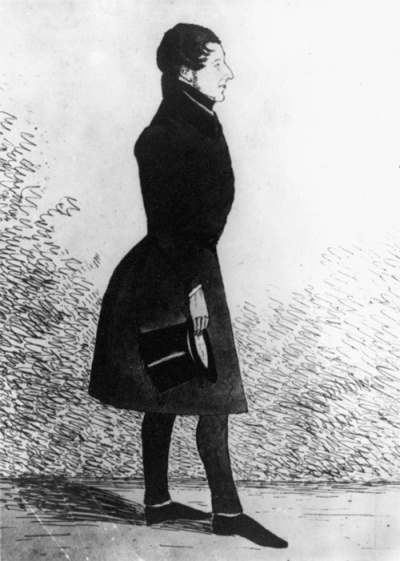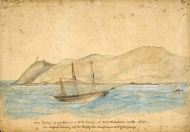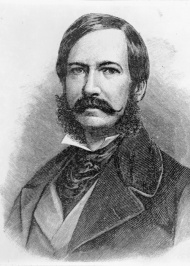Events In History
-
 19 August 1853Wakefield elected to Parliament
19 August 1853Wakefield elected to ParliamentThe originator of the New Zealand Company was elected to the House of Representatives as the member for Hutt, six months after arriving in the colony. He had been quick to lobby for the introduction of responsible government. Read more...
-
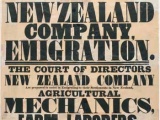 15 March 1844New Zealand Company ends colonising efforts
15 March 1844New Zealand Company ends colonising effortsHaving struggled financially for some years, the Company was in great difficulty by early 1844 in the wake of the bloody Wairau incident of June 1843. Read more...
-
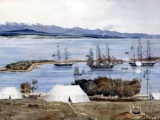 1 February 1842First NZ Company settlers arrive in Nelson
1 February 1842First NZ Company settlers arrive in NelsonThe Fifeshire arrived in Nelson with immigrants for the New Zealand Company's latest venture, which followed the settlement of Wellington, Whanganui and New Plymouth. Read more...
-
 22 January 1840First European settlers arrive in Wellington
22 January 1840First European settlers arrive in WellingtonThe New Zealand Company's first settler ship, the Aurora, arrived at Petone, founding the settlement that would become Wellington Read more...
-
 3 January 1840New Zealand Company surveyors arrive in Port Nicholson
3 January 1840New Zealand Company surveyors arrive in Port NicholsonSurveyors arrived in Port Nicholson to lay out the proposed New Zealand Company settlement of Britannia at Pito-one (Petone). This site would prove unsuitable, prompting a move across the harbour to the present-day site of Wellington. Read more...
-
 17 August 1839NZ Company ship Tory arrives
17 August 1839NZ Company ship Tory arrivesThe New Zealand Company party, which included William Wakefield and his nephew Jerningham, was sent to make preparations for organised settlement. Read more...
Articles
Exploring New Zealand's interior

After charting the coastline, European surveying and exploration of the interior were a fundamental part of the settlement process, defining the boundaries of ownership and identifying resources, useable land and access routes.
- Page 1 - Exploring New Zealand's interior After charting the coastline, European surveying and exploration of the interior were a fundamental part of the settlement process, defining the boundaries of ownership and
Treaty timeline

See some of the key events between 1800 and 1849 relating to the Treaty of Waitangi.
- Page 1 - Treaty events 1800-49See some of the key events between 1800 and 1849 relating to the Treaty of Waitangi.
The Wairau incident

On 17 June 1843, 22 European settlers and four Māori were killed when an armed party of New Zealand Company settlers clashed with Ngāti Toa over the purchase of land in the Wairau Valley, near modern-day Blenheim.
-
Page 2 – Ngāti Toa and the New Zealand Company
The Wairau incident had its origins in the migration of Ngāti Toa and its allies from Kāwhia to the Kapiti region of the southern North Island.
-
Page 3 – Violence erupts
When Te Rauparaha and Te Rangihaeata told William Wakefield to stop the survey, he instructed his brother Arthur to ignore their opposition.
-
Page 4 – The fallout from Wairau
The news from Wairau shocked settlers throughout the colony. The killing of men who had surrendered was viewed as cold-blooded murder. Many feared that these events signalled
British & Irish immigration, 1840-1914

Who were the ancestors of Pākehā New Zealand? Where did they come from and what sort of people were they? These are some of the questions which this feature sets out to answer.
-
Page 3 – Where did they come from?
The composition of the inflow from Britain and Ireland was quite different from the composition of the United Kingdom as a whole.
-
Page 4 – The English
Table and graph showing which part of England immigrants to New Zealand came from.
-
Page 5 – The Scots
Table and graph showing which part of Scotland immigrants to New Zealand came from.
-
Page 9 – Conclusions
These statistics suggest some larger conclusions about the character and values of New Zealand's founding Pākehā population
Taming the frontier

In 1832 James Busby was appointed as the official British Resident to New Zealand. After arriving in the Bay of Islands in May 1833 he took steps to tame what he saw as a chaotic frontier society.
- Page 5 - Land issues on the eve of the Treaty of WaitangiIn the late 1830s the British government became concerned about how land was being obtained from Māori. Action was needed, it decided, to protect Māori from the worst ravages of
Biographies
-
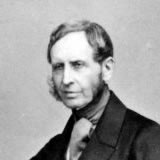 FitzRoy, Robert
FitzRoy, Robert
Robert FitzRoy, who first visited New Zealand as commander of the Beagle in 1835, was Governor from 1843, succeeding the late William Hobson. He served until 1845, when he was recalled to Britain and replaced by George Grey.
Read more... -
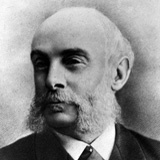 Bell, Francis Dillon
Bell, Francis Dillon
Politician Francis Bell staunchly supported the Waitara purchase in 1860, which led to the Taranaki war. In 1862 he became Minister of Native Affairs. His administration has been described as 'not particularly efficient or vigorous', although he did support the 1862 forerunner of the Native Land Court
Read more... -
 Spain, William
Spain, William
William Spain was a land commissioner who investigated the New Zealand Company's claims that it had purchased 20 million acres in 1839. The claims were not settled until several years after Spain's death
Read more... -
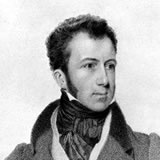 Wakefield, Edward Gibbon
Wakefield, Edward Gibbon
A clever theorist of mercurial character, Edward Gibbon Wakefield (1796-1862) masterminded the large-scale British settlement of New Zealand.
Read more... -
 Heaphy, Charles
Heaphy, Charles
The multi-faceted Charles Heaphy made quite an impact on colonial New Zealand as an artist, explorer, soldier and colonial administrator. He was the first colonial soldier to win the Victoria Cross.
Read more... -
 Featherston, Isaac Earl
Featherston, Isaac Earl
A stalwart of Wellington political life, Featherston served as provincial Superintendent and later served as a member of the House of Representatives, colonial secretary and minister without portfolio.
Read more... -
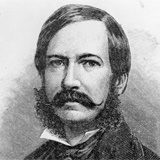 Wakefield, Edward Jerningham
Wakefield, Edward Jerningham
As the only son of New Zealand Company director Edward Gibbon Wakefield, Edward Jerningham Wakefield's life was inevitably bound up in his father's colonial and political ventures.
Read more... -
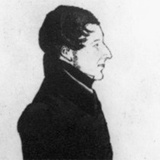 Wakefield, William Hayward
Wakefield, William Hayward
Colonel William Wakefield was one of the earliest European settlers at Port Nicholson (Wellington), where he served as the New Zealand Company’s Principal Agent between 1840 and 1848.
Read more...
Related keywords
- william wakefield
- wairau incident
- edward jerningham wakefield
- canterbury association
- MPs
- edward gibbon wakefield
- parliament
- wellington city
- settlers
- nelson city
- wakefield
- petone
- port nicholson
- charles heaphy
- wellington harbour
- te rauparaha
- ngati toa
- robert fitzroy
- te rangihaeata
- isaac featherston
- doctors
- treaty of waitangi
- land claims
- william spain
- explorers
- exploration
- surveyors
- art
- battle of waiari
- victoria cross
- francis dillon bell
- flags
- united tribes
- governor
- immigration
- immigrants
- english
- scottish
- irish
- british
- george clarke
- painting
- missionaries
- maps
- mountaineering
- european discovery
- assisted immigration
- mining
- pre-1840 contact
- welsh
- gold
- declaration of independence
- timeline
- northern war
- william hobson
- james busby
- george gipps
- maori land
- george grey
-
Main image: William Wakefield
William Wakefield, drawn as he appeared at his trial in 1826 for helping his brother Edward Gibbon Wakefield abduct a young heiress.

